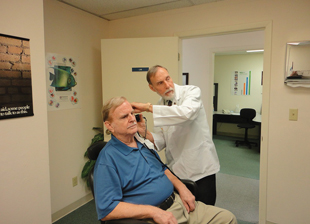Blog
-

Say what? Why we have hearing loss, what can help?
 5 Dec , 2016
5 Dec , 2016
I recently attended a concert of the Los Angeles Philharmonic at Davies Symphony Hall, and sitting from a very close vantage point to the stage, I noticed most musicians were wearing ear protection. When the brass played their loud fanfares, I understood the musicians’ caution and wished I had my own set of earplugs despite the brilliance of the sound.
As a musician with the Peninsula Symphony, I’m well aware of the dilemma of appreciating wonderful music to its fullest, versus protecting my hearing.
Hearing loss is pervasive as we age, and good hearing should never be taken for granted. According to the National Institute on Deafness and Other Communication Disorders, nearly 25 percent of adults between the ages of 65 and 74 have disabling hearing loss; the percentage doubles to 50 percent among those 75 and older.
Though hearing loss is associated with aging, it actually appears to start early: After age 12, one in eight people will already have hearing loss in both ears.
Yet only 16 percent of 20- to 69-year-olds who would benefit from hearing aids has ever used them, and fewer than a third of those age 70 and older has used them.
I asked Kimberly Webb, the supervising audiologist at Kaiser Hearing Center in Daly City, why the percentage is so low. She explained that many people perceive hearing loss as a disability or a sign of aging, and they don’t want to be stigmatized. Others may simply be unaware they have a hearing problem, she said, because hearing loss often occurs gradually. Or they deny there is a problem despite their spouses constantly asking, “Why aren’t you listening to me?”
Webb noted that hearing loss can be distressing and can lead to isolation because of the inability to communicate with friends and family. A study in the Journal of American Geriatrics in 2015 found that older adults with hearing loss experienced an accelerated rate of cognitive decline over a 25-year period, compared with those with normal hearing. But on a positive note, a study published in the September 2016 American Journal of Geriatric Psychiatry found that hearing aid use prevented mental decline.
What causes hearing loss? It can occur for a variety of reasons, but the most common is age-related hearing loss, called prebycusis (prez-buh-KYOO-sis), due to cumulative lifelong exposure to loud noise.
And what constitutes loud noise? Sound is measured by units called decibels. As reference points, normal speaking is 60-65 decibels, city traffic noise inside a car is 85 decibels. Over time, sound higher than 85 decibels can cause hearing loss. Devices that are 90 decibels or more include portable media earphones, motorcycles and power tools. Rock concerts are at least 115 decibels, and damage to hearing can occur after just 30 minutes. The amount of hearing damage caused by loud noise depends on the combination of sound volume and exposure time. Once there is hearing loss due to noise exposure, there is no cure, which is why prevention is so crucial.
If you think you might have hearing loss, get tested. If you do have hearing loss, Webb advises that the younger you are, the easier your adjustment will be to hearing aids (she always advises getting a full set, one for each ear).
Hearing aids are digital now, and the computerized innovations are becoming more useful, allowing one to minimize background noise, sync to an iPhone via Bluetooth, or connect to TV. Also, hearing aids are often fully refundable within a 45-day trial period, for any reason.
Other options to help with hearing loss include landline telephones for the hearing impaired or closed-captioned phones, which are free in the state of California. Also, a closed system “hearing loop” is available in many places of worship, auditoriums and theaters.
Researching this article inspired me to make an appointment to see an audiologist for a hearing test. I also plan on looking into “Musicians Earplugs,” custom-made acoustic earplugs developed by audiologist Mead Killion, based on a study of musicians in the Chicago Symphony Orchestra. These earplugs can reduce sound without distortion and cost a fraction of the price of high-quality hearing aids. They will be beneficial when I perform in concerts, allowing me to appreciate the symphony of sounds while also protecting my hearing.
Source: Jerry Saliman, M.D.
Image credit: www.jweekly.com





























































































































































































































































































































































































































































































































































































